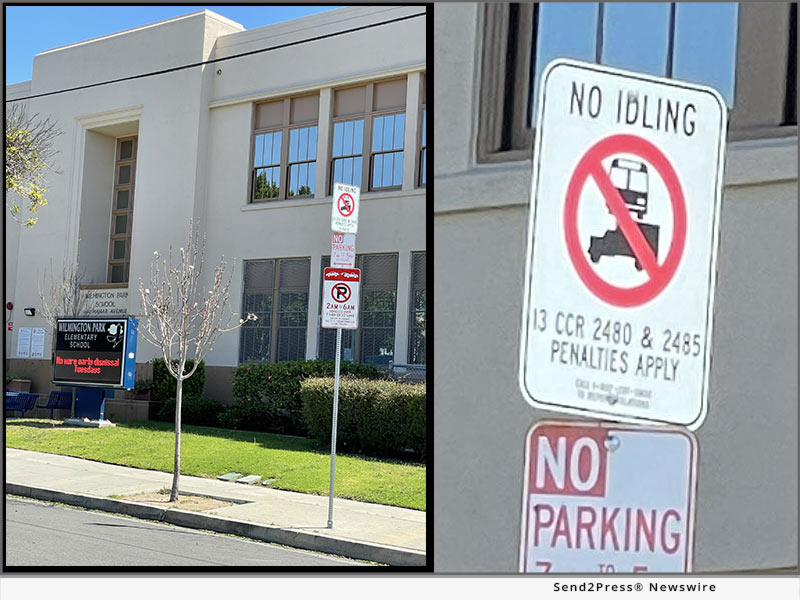LOS ANGELES, Calif. /California Newswire/ — California Safe Schools (CSS) today celebrates the implementation of “No Idling” signs near 50 school “hotspot” sites to eliminate diesel exhaust that can have immediate health effects especially for sensitive receptors like school children. Diesel exhaust contains toxic substances such as arsenic, benzene, formaldehyde and nickel that can contribute to mutations in cells that have progressed to cancer.
In fact, the California Environmental Protection Agency’s Office of Environmental Health Hazard Assessment (OEHHA), comprehensive assessment found that “long-term exposure to diesel exhaust particles poses the highest cancer risk of any toxic air contaminant evaluated by OEHHA.”

CSS Founder and Executive Director, Robina Suwol, who has guided the project since 2018, recognized everyone’s efforts on this critical clean air initiative. “We believe everyone is entitled to clean air and equal protection under the law so we prioritized schools and adjacent communities heavily overburdened by cumulative impacts from multiple environmental sources of pollution. We are grateful for the support from the California Air Resources Board (CARB), South Coast Air Quality Management District (SCAQMD), students, teachers, parents, residents, community leaders and the Los Angeles Unified School District for their assistance in identifying the sites, and to the LA City Department of Transportation for installing 50 signs.”
With asthma being the most common chronic condition among children affecting 6.6 million, recent studies have reinforced the importance of eliminating diesel pollution. An international team determined how ultrafine particles can get deep into lungs, stimulate the nerves and exacerbate respiratory conditions.
Jesse Marquez relates why he joined in the “No Idling” campaign. “As a lifelong resident of Wilmington and Executive Director of Coalition for a Safe Environment, we were pleased to have worked with California Safe Schools to identify streets adjacent to public schools, parks, and residential areas where “No Truck Idling” signs have been installed to reduce public exposure to freight truck exhaust air pollution and noise.”
Chief of California Air Resources Board’s Enforcement Division, Todd Sax said, “These No Idling signs, championed by groups including California Safe Schools, help reduce the impact of truck traffic in communities. Using a portion of the proceeds from enforcement actions, CARB is funding important, on-the-ground solutions like this one that help clean the air for schoolchildren and improve the quality of life for everyone in these hard-hit communities.”
Cynthia Babich of the Del Amo Action Committee observed how the signs will help her community. “No Idling” signs mark the beginning of enforceable actions to improve decades of inappropriate land use planning that has allowed warehouses and trucking facilities onto residential streets in our environmental justice community.”
The CSS “No Idling” project was funded through a Supplemental Environmental Project administered by the California Air Resources Board (CARB). This policy allows community-based projects to be funded from a portion of the penalties received during settlement of enforcement actions. SEPs can improve public health, reduce pollution, increase environmental compliance, and bring public awareness to neighborhoods most burdened by environmental harm. The current policy also includes a public process to solicit potential SEPs from disadvantaged communities.
About California Safe Schools:
California Safe Schools (CSS) is children’s environmental health and environmental justice non-profit committed to ensuring that all students, teachers, staff, and community members who live near school sites are in a safe, toxic-free environment. CSS works closely with diverse communities and regulatory agencies on toxic issues (air, water, soil). CSS achieved national prominence by spearheading the Los Angeles Unified School District’s Integrated Pest Management (IPM) Policy, the most stringent pesticide policy in the nation for K-12 public schools. This was the first school district to embrace the “Precautionary Principle” and “Right to Know” in a policy and led to the passage of California’s Healthy Schools Act. Today, the LA Unified IPM policy serves as a national and international model for school districts and communities.
Learn more at: http://calisafe.org/
CITATIONS:
https://oehha.ca.gov/air/health-effects-diesel-exhaust
https://www.sciencedaily.com/releases/2017/05/170522080928.htm
Learn More: http://www.calisafe.org/
This version of news story was published on and is Copr. © 2022 California Newswire® (CaliforniaNewswire.com) – part of the Neotrope® News Network, USA – all rights reserved.
Information is believed accurate but is not guaranteed. For questions about the above news, contact the company/org/person noted in the text and NOT this website.















